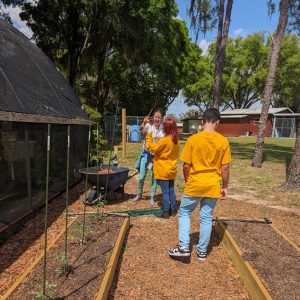What is the first thing that comes to mind when you think about community gardening? You may be picturing a patch of land dedicated to growing fruits and veggies collaboratively, or a collection of individual plots.
And you would be correct. But if you take a closer look, you’ll see much more than plants. These spaces are about opportunity. Community gardens have positive impacts on culture, economy, environment, as well as social and health benefits.
Cultural Exchange and Community Gardens
Picture chatting with neighbors while tending to plants and swapping stories about family recipes or gardening tricks passed down through generations. These gardens are places where people connect, build friendships, and share their experiences.

Community Resilience and Gardening
In our daily lives, we all face the element of uncertainty, community gardens offer a sense of security through food sovereignty. These gardens were created to help people be more self-sufficient, so communities could grow their own food and make sure they always had enough to eat on their own. When people learn to grow their own food, they take control over what they eat. This doesn’t just help them be more independent but also gives them something to rely on when things get tough.
The COVID-19 Pandemic is a perfect example where these spaces remained open, safe, and accessible in uncertain times. Dr.Whitney Elmore, County Extension Director, Urban Horticulture Agent, and Master Gardener Coordinator, said “I never will forget the individual; during the height of the pandemic telling me how our garden saved her life. She had lost her job, had children, was isolated and depressed. The garden gave her purpose, food, and hope.”
Good under Pressure
When things like natural disasters or problems with getting food happen, having locally grown fruits and veggies can be helpful. These gardens can supplement produce so fresh, healthy food, is available in times of crisis.
In today’s uncertain economy, knowing how to grow your own food is really important. Community gardens serve as a meeting ground to help people learn how to plant, grow, and harvest fresh fruits and veggies. By doing this, they help folks feel more confident and independent, no matter what’s going on in the world.
Conclusion
Community gardens are more than just patches of land—they’re places where change happens, and people come together. Community gardens make our society greener, stronger, and more united.
As our world keeps changing, community gardens show us how working together can make a big difference. By planting seeds and looking after the Earth, communities build strong bonds that help them stay strong, even when things get hard. These gardens aren’t just about growing food—they’re about growing resilience and building a better future for everyone.
Stick around to read about the social impacts of community gardens!
Have a question?
If you have any questions about gardening in Central Florida, please contact UF/IFAS Extension Pasco County at 352-518-0156. For more information on UF/IFAS Extension Pasco County Community Gardens, and how you can join one, visit http://sfyl.ifas.ufl.edu/pasco/. Supervising agent: Dr. Whitney Elmore.
Follow us!
We have several ways to connect. Visit our Facebook, Instagram, Eventbrite, Blogs, Florida-Friendly Facebook, & Website.
More resources:
- UF/IFAS Extension Pasco County
- Dr. Whitney Elmore’s Podcast: Rooted in Florida
- The Value of Community Gardens: Social Impact
- The Value of Community Gardens: Cultural Impact
Read the series:
- Dr. Whitney Elmore’s Podcast: Rooted in Florida
- The Value of Community Gardens: Social Impact
- The Value of Community Gardens: Cultural Impact
- The Value of Community Gardens: Mental Health Impact
- The Value of Community Gardens: Health Impact
 1
1
